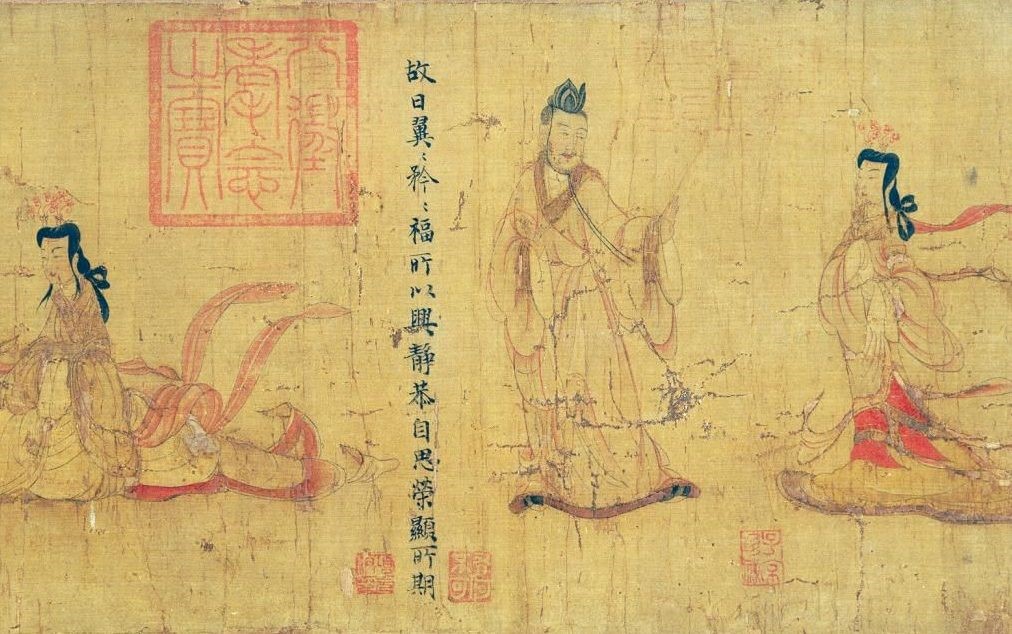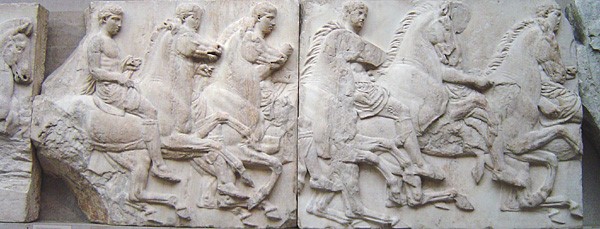Repatriation of Antiquities and Cultural Diplomacy: China and Greece
Repatriation of antiquities
is an essential aspect of a coherent museum policy and of course of a greater
cultural diplomacy for countries with great historical depth like China and
Greece. China and Greece are two ancient nations and modern states that are
inheritors of two great civilizations that have formed the building blocks of
the civilizations of Asia and Europe respectively. China and Greece face
similar challenges concerning protection of their cultural identity and their
historic antiquities. The importance of the unification of historic
collections, monuments and cultural artifacts, is a top priority for the cultural
diplomacy goals of our nations.
The
National Museum of China with a permanent collection of 1,050,000 items from
all periods of Chinese history ranks among the greatest and most important
museums in the world. When I recently visited China, I had the rare opportunity
to visit this museum and enjoy its variety of cultural wealth. In Greece, the
Acropolis Museum was built to house every artifact found on the Acropolis rock
and on the surrounding slopes. It was essentially built to host again the
emblematic stolen antiquities: the Parthenon Marbles and the Caryatid (a female
statue, part of an architectural complex), now hosted in the British Museum. These two museums rank among the most advanced globally equipped with
state-of-the-art technology and facilities for the protection and preservation
of exhibits.
There are
emblematic antiquities outside our borders that need to be returned to their
rightful owners, China and Greece. Especially the British Museum in London
holds many Chinese and Greek antiquities and items of great historical and
symbolical significance. China has emphatically joined the just demands for the
British Museum to return all the improperly acquired art and artifacts
currently held in its collection.
23,000 Chinese artifacts are held in the British Museum. Among these one can mention the tri-colored luohan statues, ritual bronzes from the Shang and Zhou dynasties, stone Buddhist sutra scrolls of the Wei and Jin dynasties, and other extremely valuable national treasures. The Parthenon Marbles are a collection of Classical Greek marble sculptures that originally formed part of the temple of the Parthenon and other buildings on the Acropolis of Athens, such as the Erechtheum and the Temple of Athena Nike. The Marbles were violently detached by the Parthenon and stolen by British Lord Elgin in the early 19th century.

Fig. 1: Gu Kaizhi,
Admonitions of the Instructress to the Court Ladies (ca. 400–700), British
Museum.

Fig. 2: Phidias, Section of
a frieze from the Parthenon (ca 447-438 BC), British Museum
Other
historical nations too have raised the issue demanding the return of emblematic
antiquities still held in the British Museum, such as Egypt. The Rosetta Stone is a stele inscribed with three versions of a decree
issued in 196 BC in Memphis during the Ptolemaic Dynasty. The top and middle
texts are in Ancient Egyptian with hieroglyphic and Demotic scripts
respectively, while the bottom is in Ancient Greek. The Rosetta Stone was the
key for the decipherment of ancient Egyptian scripts. Egypt has
repeatedly raised the issue of the repatriation of the Rosetta Stone. Nigeria
and Ethiopia too have voiced similar just demands.
In an era
of technological breakthroughs, such as advanced digital 3D-printing, foreign
museums that hold emblematic Chinese and Greek antiquities and other artifacts
can benefit by hosting faithful copies. Additional long-term exhibitions of Chinese
and Greek artifacts generously loaned for a period by the museum authorities of
China and Greece could enrichen the temporary exhibition items of Western
museums. Simply put, there are no more excuses for denying repatriation of
stolen antiquities and retribution of historical justice.
On a
diplomatic level, China and Greece –along with other nations, such as Italy, Egypt,
Ethiopia, and Nigeria- can create a cultural alliance that shall safeguard
their rich heritage and restore emblematic ancient works of art to their
rightful owners. China and Greece can form a Forum for Repatriation of Stolen
Antiquities that shall actively push for the return of antiquities, but most
emphatically for those embedded with great symbolic value for modern China and
Greece.
The
historical past forms a fundamental aspect of our current national identity. China
is a nation based on a rich and multifaceted historical identity embracing all
historical periods. Greece is the inheritor of ancient Greek culture and has a
multiple modern identity. Culture may be international, but is national too.
The Chinese civilization has an international dimension that has benefited the
peoples of Asia in their own historical development, but it also distinctly a
national civilization and a structural component of modern Chinese identity.
The Greek civilization has an international dimension as the bedrock of Western
culture, but is also distinctly a national civilization of the Greek nation and
an integral part of modern Greek identity.
In this
sense, repatriation of antiquities to modern state-of-the-art Chinese and Greek
museums is a top diplomatic priority that equals to historic justice. The
cultural diplomacy of China and Greece can coordinate to advance the just
demands of the two nations and safeguard the protection of cultural creation
and respect for the rights of peoples across the world.
The author Ioannis E. Kotoulas (Ph.D. in History, Ph.D. in Geopolitics)
is Adjunct Lecturer in Geopolitics, University of Athens, Greece, a Guest
Scholar of the Chinese Academy of Social Sciences and Tsinghua University.
